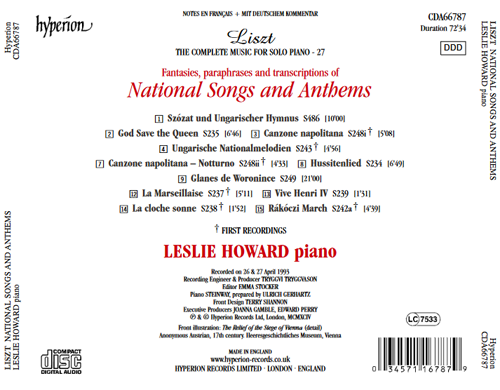
In his years of travel Liszt was frequently obliged to improvise on themes suggested to him by members of his audience, and so, apart from popular operatic arias of the day, some of the most likely requests were national favourites, if not indeed the very anthems, of the country in which he found himself. Unfortunately, not all of these improvisations came to be notated and published, although there is always the possibility that more will turn up (there are persistent rumours about a piece based on ‘Rule, Britannia’, for example). The pieces in the present collection are by no means the whole of Liszt’s surviving production in this field. The Hungarian pieces form a literature of their own, and various French, German, Swiss, Spanish and Russian melodies appear in other volumes in this project—but they do include all the actual national anthem paraphrases. (Apart from odd ‘Album Leaves’, the other works of this kind not included in the present programme are the Five Hungarian Folk Songs and A Puszta Keserve (recorded in Vol 12), Faribolo pastour, Chanson du Béarn, Fantaisie romantique sur deux mélodies suisses and other Swiss pieces (in Vol 20), the Magyar Dalok and Magyar Rapszódiák (Vol 29), the Rapsodies hongroises, the Chanson bohémienne, the Gaudeamus igitur pieces and the Spanish works.)
More Notes of Leslie Howard
2.2.22
FRANZ LISZT : Fantasies, paraphrases and transcriptions of National Songs and Anthems (Leslie Howard) (1998) APE (image+.cue), lossless
Assinar:
Postar comentários (Atom)
+ last month
ROSA HENDERSON — Complete Recorded Works In Chronological Order Volume 1 (1923) DOCD-5401 (1995) FLAC (tracks+.cue), lossless
All of classic blues singer Rosa Henderson's recordings are available on four CDs from the Austrian Document label. The first volume mos...




.jpg)

.jpg)




https://nitro.download/view/4377FB27335DF41/Franz_Liszt_-_Fantasies_on_National_Songs_and_Anthem.rar
ResponderExcluir